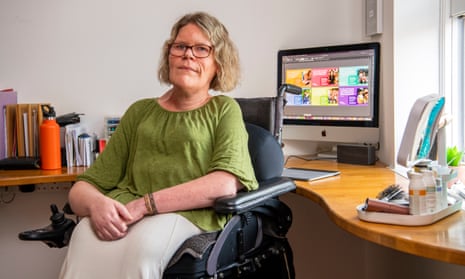Katy Etherington runs a website, PA Pool, that matches disabled people with personal assistants (PAs). “Last year, we had 460 PAs join from Poland, and this year we’ve only had 36,” she says. “It’s a serious problem.”
Before Brexit, most of the people who worked as a personal assistant to Etherington herself were from mainland Europe. Of the current team who help her live and work independently, three are from the EU and have settled status – but if they leave, the thought of having to replace them is, she says, “terrifying”.
What it means is that, for many disabled people who employ PAs, “there is a crisis. [They assist with] basic stuff, such as being able to get out of bed, get dressed, go to the loo, have something to eat and drink. And if you can’t find somebody to fill that role, what can you do? They provide such an important role – it’s life-enabling. They enable us to live, to work, not to just exist.” Without the prospect of employing people independently, many disabled people would be forced to seek residential care – but “care homes are struggling too”, says Etherington.
Before Brexit, around 8% of the social care workforce came from other EU countries. Some of those people will have stayed, but leaving the EU has exacerbated the staff shortage. Professor Martin Green, chief executive of Care England, says there are 167,000 vacancies in social care across England, and a 30% staff turnover. Without adequate staffing, the number of beds in residential homes will be forced to decrease. “In learning disability services, you might have to close the service altogether,” says Green. “In home care, there’ll be a real crisis around getting enough staff to be able to support people. So it might mean, for example, that somebody is not supported for two or three hours, and that might mean that they’re in their own bed, lying in urine, rather than having had somebody to help them. Or that people are not going to get fed on time. These are the realities of what a staff shortage means in social care.”
He says there is “no recognition in government that there is a real problem. All they keep doing is mouthing the platitude of ‘you’ve just got to pay workers more’. Well, people need to remember that our customer is the government, and the government has steadfastly refused to pay workers more.” Care providers are competing for staff with, for instance, supermarkets, which tend to offer higher hourly rates. “The supermarkets can transfer the cost on to their customer. We can’t do that because the government will not pay the true costs of care.”
Finding enough of the right people is also challenging, because working in social care requires special skills and personalities. “It is not for everybody,” says Green. “It’s not just a question of saying, ‘there are X number of people unemployed, they can go into social care’. This requires people who’ve got the right values, and the right connection with the people who use services. It’s both emotionally and physically draining, as well as poorly paid.”
Etherington agrees, and adds that being a PA – especially a live-in assistant – comes with extra challenges. “It’s a difficult career to sustain over a long period of time, because you’re literally living someone else’s life.” It tended to suit people from mainland Europe who only planned to be in the UK for a few years; some, she says, even commuted from their home countries to work in live-in positions for a few weeks at a time.
For disabled people who employ live-in care – a small part of the vast social care sector, but still representing an estimated 100,000 people – there is also the issue of cost. British PAs, says Etherington, expect much higher pay than those from the EU – and these higher wages were presented as a good thing by Boris Johnson in his conference speech. Etherington stresses that carers “do deserve a decent wage”, but the many people whose care is paid for through funding “don’t get enough to be able to pay those kind of rates. European PAs are happy to work for less as the cost of living in their country is lower, so to some extent I do agree that this could have an effect on lowering UK wages, but it enabled the people on lower budgets to find the support they needed. More funding is definitely required – and do the government have the extra cash to do that right now?”
As it stands, Etherington is holding on to the hope that her team of PAs “will be around for a while. I’ve always really got on well with European PAs, they’ve just been amazing,” she says. “We’ve lost that now.”






